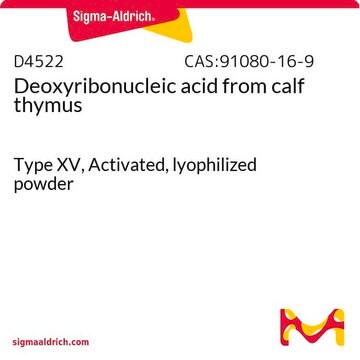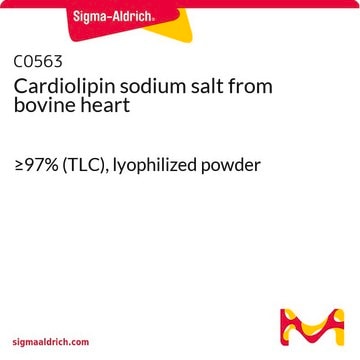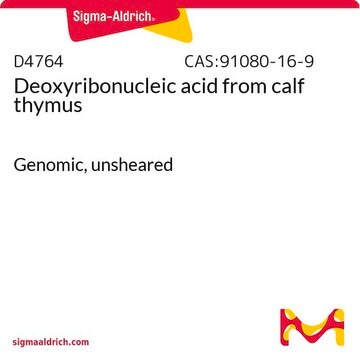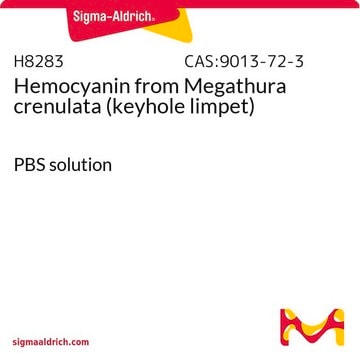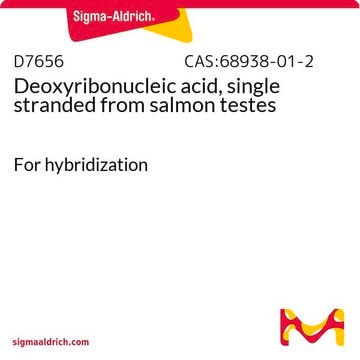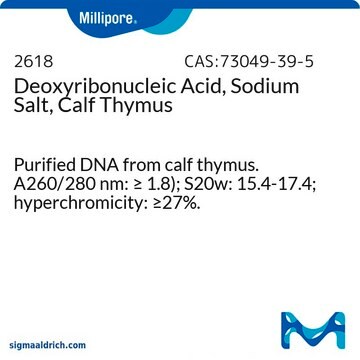D8899
Deoxyribonucleic acid, single stranded from calf thymus
lyophilized powder
Sinónimos:
DNA single stranded
Iniciar sesiónpara Ver la Fijación de precios por contrato y de la organización
About This Item
Número de CAS:
EC Number:
MDL number:
UNSPSC Code:
41106310
eCl@ss:
32160414
NACRES:
NA.52
Productos recomendados
grade
for molecular biology
Quality Level
form
lyophilized powder
mol wt
~50 kb
composition
ssDNA, ≥65%
storage temp.
−20°C
¿Está buscando productos similares? Visita Guía de comparación de productos
General description
High quality single-stranded template DNA isolated from the thymus of male and female calves.
Application
Calf thymus DNA is exceptionally useful as a substrate for DNA polymerase assays, in the amplification of very long fragments and as a carrier DNA for precipitations. It was used as a standard for DNA quantification by fluorescent assay and in DNA-binding assay.
Calf thymus DNA is exceptionally useful as a substrate for DNA polymerase assays, in the amplification of very long fragments and as a carrier DNA for precipitations.
Features and Benefits
• Activated
• No nuclease activity detected after 16 h at 37 °C incubation
• High quality template DNA
• No nuclease activity detected after 16 h at 37 °C incubation
• High quality template DNA
Quantity
One mg DNA is approx. 25 A260 units.
Preparation Note
Prepared by a modification of the method of Alberts and Herrick from calf thymus DNA.
Reconstitution
Dissolve the DNA gently rocking overnight to a final concentration of 1mg/ml in molecular biology grade water.
related product
Storage Class
10 - Combustible liquids
wgk_germany
WGK 3
flash_point_f
Not applicable
flash_point_c
Not applicable
ppe
Eyeshields, Gloves
Certificados de análisis (COA)
Busque Certificados de análisis (COA) introduciendo el número de lote del producto. Los números de lote se encuentran en la etiqueta del producto después de las palabras «Lot» o «Batch»
¿Ya tiene este producto?
Encuentre la documentación para los productos que ha comprado recientemente en la Biblioteca de documentos.
Los clientes también vieron
H Kamei
Cell biology international, 20(11), 769-775 (1996-11-01)
The anti-desmin monoclonal antibodies (MAbs) DSB389, AC54, and DSB860 recognize intermediate filaments (IFs) and nuclear antigens that appear granular, locate around chromosomes, and are insoluble following 0.5% Triton X-100 and cetyltrimethylammonium bromide (CTAB) extraction. Nuclear antigens of the MAbs were
J A Hansen et al.
Journal of animal science, 75(7), 1810-1821 (1997-07-01)
We evaluated the effects of recombinant porcine somatotropin (pST) and the beta-adrenergic agonist salbutamol on plasam endocrine and metabolite profiles and muscle chemistry in three genotypes of growing barrows (n = 96, 139 d old). Treatments were in a 2
Qiong Guo et al.
Spectrochimica acta. Part A, Molecular and biomolecular spectroscopy, 106, 155-162 (2013-02-05)
A divanadium(V) complex, [V2O3(o-van-val)2] (o-van-val=Schiff base derived from o-vanillin and L-valine), has been synthesized and structurally characterized. The crystal structure shows that both of the vanadium centers in the complex have a distorted octahedral coordination environment composed of tridentate Schiff
Eswaran Ramachandran et al.
Inorganic chemistry, 52(3), 1504-1514 (2013-01-18)
A series of four new palladium(II) complexes of 2-oxo-1,2-dihydroquinoline-3-carbaldehyde thiosemicarbazones with triphenylphosphine as coligand have been synthesized and characterized by the aid of various spectral techniques. The single-crystal X-ray diffraction studies revealed that the unsubstituted thiosemicarbazone ligand acted as monobasic
Inessa Halets et al.
International journal of pharmaceutics, 454(1), 1-3 (2013-07-09)
In most articles, cytotoxicity of cationic polyamidoamine (PAMAM) dendrimers toward red blood cells has been exclusively explained by their surface charge. We have focused on dendrimer hydrophobicity as a second possible factor that determines this cytotoxicity. Using PAMAM-NH2 dendrimers from
Nuestro equipo de científicos tiene experiencia en todas las áreas de investigación: Ciencias de la vida, Ciencia de los materiales, Síntesis química, Cromatografía, Analítica y muchas otras.
Póngase en contacto con el Servicio técnico